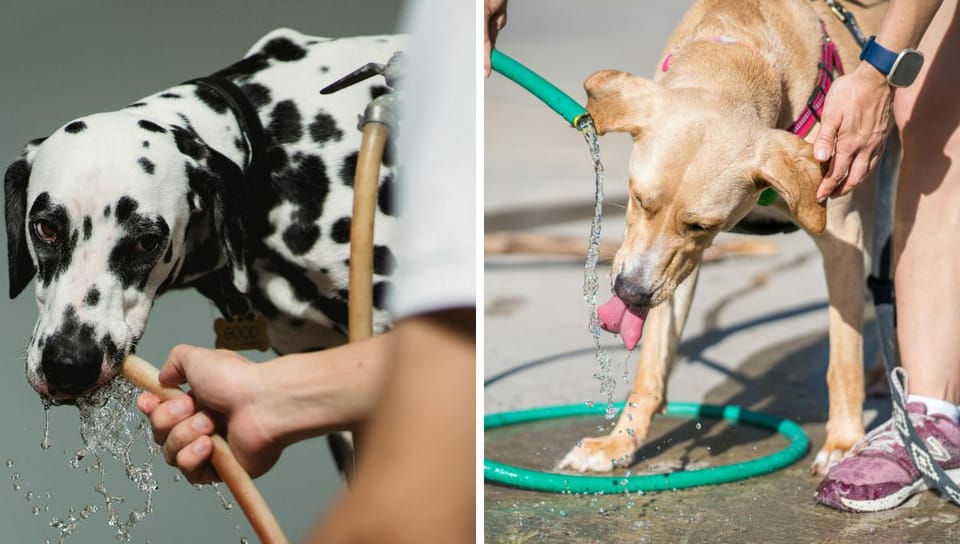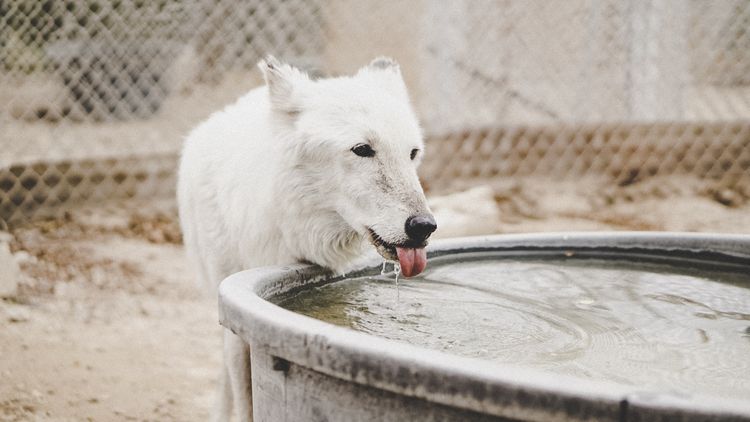How to Tell if Your Dog is Dehydrated

Key Takeaways:
- Recognizing dehydration in dogs is crucial for their health and well-being.
- Simple tests and observations can help identify dehydration early.
- Immediate action and veterinary care are essential to address dehydration.
Understanding Dehydration in Dogs
Dehydration in dogs occurs when they lose more fluids than they take in, leading to an imbalance in their body's electrolytes. This condition can be caused by various factors such as excessive heat, illness, or insufficient water intake. Recognizing the signs of dehydration early can prevent serious health issues and ensure your furry friend stays healthy and happy.
Dogs rely on water for numerous bodily functions, including digestion, circulation, and temperature regulation. When they become dehydrated, these processes can be disrupted, leading to symptoms like lethargy, dry gums, and sunken eyes. Understanding the causes and signs of dehydration is the first step in ensuring your dog remains hydrated and healthy.
Common Causes of Dehydration
One of the primary causes of dehydration in dogs is inadequate water intake. Dogs need a consistent supply of fresh water, especially during hot weather or after physical activity. If your dog isn't drinking enough water, they can quickly become dehydrated, leading to serious health issues.
Illnesses such as vomiting, diarrhea, and fever can also cause dehydration. These conditions lead to a rapid loss of fluids and electrolytes, making it essential to monitor your dog's hydration levels closely. Additionally, certain medical conditions like kidney disease and diabetes can increase the risk of dehydration, requiring careful management and regular veterinary check-ups.
Recognizing the Signs of Dehydration
One of the most noticeable signs of dehydration in dogs is a loss of skin elasticity. You can test this by gently pinching the skin on the back of your dog's neck. If the skin doesn't snap back quickly, it may indicate dehydration. Other signs include dry or sticky gums, sunken eyes, and a dry nose.
Behavioural changes can also signal dehydration. A dehydrated dog may become lethargic, weak, or less interested in activities they usually enjoy. They might also exhibit excessive panting or have a rapid heart rate. Paying attention to these signs can help you identify dehydration early and take appropriate action.
Simple Tests to Check for Dehydration
Performing a skin elasticity test is a quick and easy way to check for dehydration. Gently pinch the skin on the back of your dog's neck and observe how quickly it returns to its normal position. If the skin takes longer than usual to snap back, it could be a sign of dehydration.
Another simple test involves checking your dog's gums. Lift their lip and touch their gums with your finger. Healthy gums should be moist and pink. If the gums are dry, sticky, or pale, it may indicate dehydration. Additionally, you can press your finger against the gums and observe how quickly the color returns. Slow capillary refill time can be a sign of dehydration.
Preventing Dehydration in Dogs
Ensuring your dog has access to fresh water at all times is the most effective way to prevent dehydration. Place water bowls in easily accessible locations and refill them regularly. During hot weather or after exercise, encourage your dog to drink more water to compensate for the fluids lost through panting and sweating.
In addition to providing water, you can also offer your dog hydrating treats like ice cubes or water-rich fruits and vegetables. Monitoring your dog's water intake and adjusting their diet as needed can help maintain proper hydration levels. Regular veterinary check-ups can also help identify any underlying health issues that may contribute to dehydration.
When to Seek Veterinary Care
If you suspect your dog is dehydrated, it's important to seek veterinary care immediately. Severe dehydration can lead to serious complications, including organ failure and death. Your veterinarian can perform a thorough examination and provide the necessary treatment to rehydrate your dog and address any underlying health issues.
In some cases, your veterinarian may recommend intravenous fluids to quickly restore your dog's hydration levels. They may also conduct tests to identify any underlying conditions contributing to dehydration. Early intervention and proper medical care are crucial in ensuring your dog's recovery and preventing future episodes of dehydration.
Hydration Tips for Active Dogs
Active dogs, especially those that participate in outdoor activities or sports, are at a higher risk of dehydration. To keep your active dog hydrated, always carry a portable water bottle and bowl during walks, hikes, or play sessions. Offer water breaks frequently and encourage your dog to drink small amounts of water regularly.
In addition to water, you can also provide electrolyte solutions designed for dogs to help replenish lost fluids and minerals. These solutions can be especially beneficial during intense physical activities or hot weather. Monitoring your dog's hydration levels and adjusting their water intake based on their activity level can help prevent dehydration and keep them healthy and active.
The Role of Diet in Hydration
Your dog's diet plays a significant role in maintaining proper hydration levels. Wet dog food contains a higher water content compared to dry kibble, which can help keep your dog hydrated. If your dog primarily eats dry food, consider adding water or broth to their meals to increase their fluid intake.
Incorporating water-rich fruits and vegetables into your dog's diet can also help boost their hydration. Foods like cucumbers, watermelon, and celery are excellent sources of water and can be offered as healthy snacks. Always consult your veterinarian before making any significant changes to your dog's diet to ensure it meets their nutritional needs.
Hydration and Senior Dogs
Senior dogs are more susceptible to dehydration due to age-related changes in their bodies. As dogs age, their ability to conserve water decreases, making them more prone to dehydration. It's essential to monitor your senior dog's water intake closely and provide additional hydration support as needed.
Regular veterinary check-ups are crucial for senior dogs to identify any underlying health issues that may contribute to dehydration. Your veterinarian can recommend appropriate dietary adjustments and hydration strategies to keep your senior dog healthy and hydrated. Ensuring your senior dog has access to fresh water and encouraging them to drink regularly can help prevent dehydration and support their overall well-being.
Summary
Dehydration in dogs is a serious condition that requires prompt attention and care. By understanding the causes, recognizing the signs, and taking preventive measures, you can ensure your dog stays hydrated and healthy. Regular veterinary check-ups, a balanced diet, and proper hydration practices are essential in maintaining your dog's well-being. If you suspect your dog is dehydrated, seek veterinary care immediately to prevent complications and ensure a speedy recovery.
FAQ
- How much water should my dog drink daily?
The amount of water a dog needs can vary based on their size, age, and activity level. As a general rule, dogs should drink about one ounce of water per pound of body weight each day. For example, a 50-pound dog should drink approximately 50 ounces of water daily. Always ensure your dog has access to fresh water and monitor their intake, especially during hot weather or after physical activity.
- Can I give my dog electrolyte solutions?
Yes, you can give your dog electrolyte solutions designed specifically for pets. These solutions can help replenish lost fluids and minerals, especially during intense physical activities or hot weather. However, it's important to consult your veterinarian before introducing any new supplements to your dog's diet to ensure they are safe and appropriate for your pet's needs.
- What should I do if my dog refuses to drink water?
If your dog refuses to drink water, try offering them water-rich foods like wet dog food, ice cubes, or water-rich fruits and vegetables. You can also try adding a small amount of low-sodium broth to their water to make it more appealing. If your dog continues to refuse water or shows signs of dehydration, seek veterinary care immediately to address any underlying health issues and ensure proper hydration.

